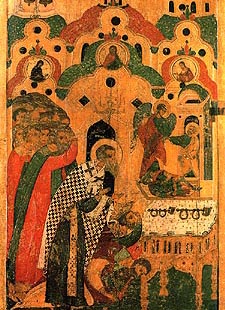|
|||
|---|---|---|---|
| This weekly bulletin insert complements the curriculum published by the Department of Christian Education of the Orthodox Church in America. This and many other Christian Education resources are available at http://dce.oca.org. | |||

Saint Tatiana of Rome and Saint Peter the Apostle are two saints who suffered because of the double-mindedness, or indecision, of powerful people. Tatiana lived in the early third century, and belonged to an eminent Christian family. Well-educated in the faith, she was a deaconess, and could speak about Jesus Christ with conviction and effectiveness. The Emperor of Rome at the time, Alexander, was the son of a Christian mother, but he himself could not make up his mind about the faith. He kept statues of Christ and Apollo, and of Abraham and Orpheus, in his palace—an obvious sign of his double-mindedness. His advisors apparently became impatient with his hesitation, and on their own began to persecute the troublesome Christians in the empire. Tatiana was a victim of these persecutions, though she had many miraculous recoveries from torture before being beheaded, resolutely praying up to the moment of death for her persecutors. Perhaps if Alexander had been as decisive about the faith as Tatiana was, she would not have had to die at those persecutors' hands. The Holy Apostle Peter was also the victim of a double-minded ruler. This was Herod Agrippa, who, as we read in Acts 12: 1, laid violent hands on some members of the Church. He went on to kill James, one of the sons of Zebedee. And then "...when he saw that it pleased the Jews, he proceeded to arrest Peter also." Peter had committed no crime; it was only that Herod didn't take seriously enough his responsibility to be a just ruler. He allowed a competing desire to please the Jews to overwhelm him, and so the innocent Peter found himself imprisoned in chains. The Book of Acts goes on to relate the coming of an angel who awakens Peter as he sleeps in his cell late at night. The angel commands him to get up quickly, get dressed, and put on his sandals. As he does so, the chains fall from his hands. He follows the angel past two guards to the prison's iron gate, which opens by itself and lets them pass freely out to the city. In gratitude for this saving miracle, the Church designates a day to venerate Peter's chains as a tangible sign of God's care. 
Peter, of course, had his own moments of double-mindedness. His faith faltered when Christ enabled him to walk on water, and as a result he began to sink. Challenged at a moment of danger on the night Jesus was arrested, he denied even knowing the Lord he had been with for years. The Epistle of James reminds us that we can ask God for wisdom and He will give it to us "generously and without reproaching..." But we need to ask in faith, with no doubting. The person who asks "must not suppose that a double-minded man, unstable in all his ways, will receive anything from the Lord" (James 1:8). |
|||
